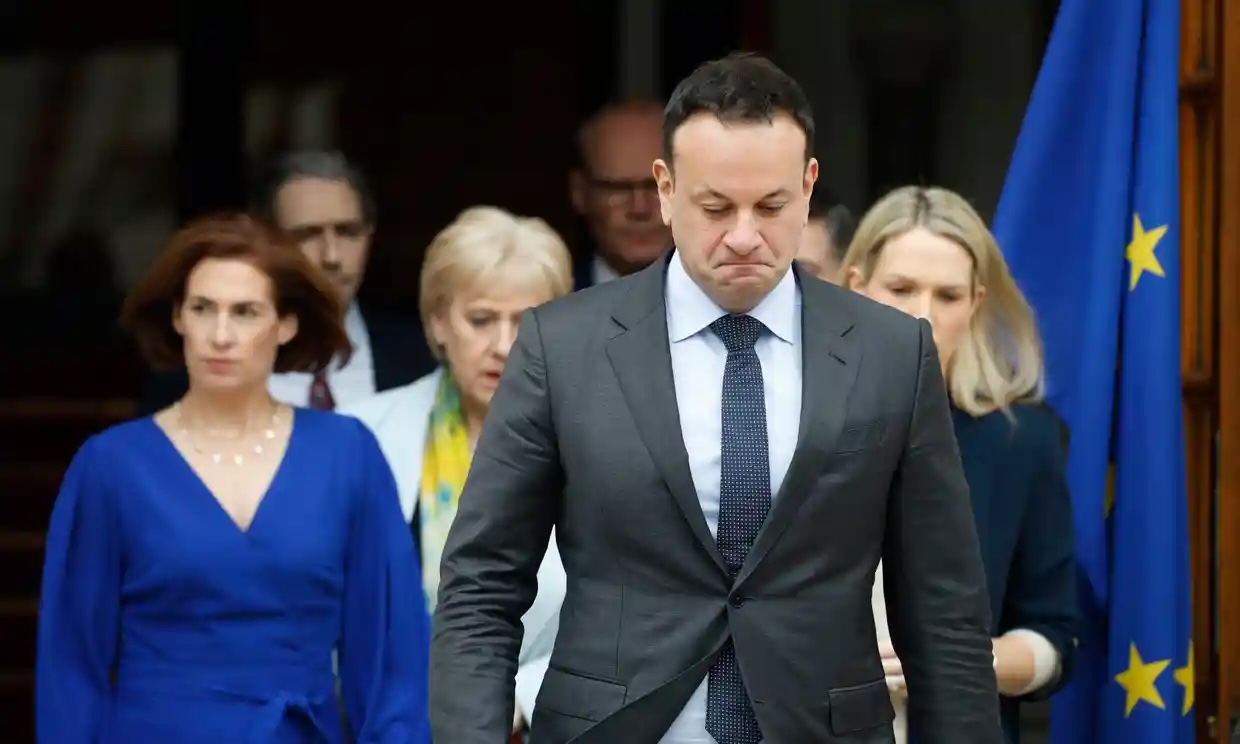
The Dublin government is reeling from the sudden announcement of Leo Varadkar’s departure as Taoiseach and is under immense pressure to allow the voters of the 26 Counties to choose his successor.
In a dramatic resignation speech on Wednesday, Mr Varadkar quit as Fine Gael leader and said he will stay on as Taoiseach until a replacement has been chosen by his party.
He made history as Ireland’s youngest Taoiseach, the first one to be gay and the first from a racially mixed background.
‘I couldn’t find anyone to stab me in the back, so I fell on my sword instead,’ Mr Varadkar reportedly told a private Fine Gael meeting on the eve of his dramatic resignation announcement when he said he was “not the best person for the job any more”.
His party is already seeking nominations for his successor, tipped by bookies to be the current Minister for Higher Education, Simon Harris. Nominations close next Monday at 1pm.
Simon Coveney, Fine Gael’s deputy leader, has already ruled himself out of the race. “I got my chance and wasn’t successful the last time,” he said.
Speaking at Varadkar’s final Leaders’ Questions as Taoiseach, Sinn Féin leader Mary Lou McDonald urged his government to put its record before the people in a general election.
Ms McDonald said that Mr Varadkar’s announcement has led the country to a “critical moment” and that the decision of who leads the government must be handed to the public through an election.
“Today’s announcement can have only one conclusion — the calling of a general election,” Ms McDonald said.
“You have stated that it is your time to go and that you are not the person for the job. It is clear that it’s time for this entire government to go, to allow people to have their say and allow the election of a new government.”
Ms McDonald said it is “unthinkable” that Fine Gael would select a new Taoiseach.
“In my strong opinion, that confidence of the people can only be demonstrated, tested, and validated through the ballot box,” she said.
“I put it to the Taoiseach again that rather than limping on and passing the office of Taoiseach among the members of the government again, the correct democratic route at this point is to go to people, put the government’s record before them and have all of us ask them, in a spirit of humility, who should lead.”
Mr Varadkar said there that a general election would be held within a year in any event.
“We want to continue to focus on the issues at hand, such as housing, the cost of living, managing migration better, our health service and law and order,” Mr Varadkar said, listing the crises which formed the backdrop to his shock resignation.
Aontú TD Peadar Tóibín said that “this is no way to run a country. The position of Taoiseach is being thrown around like snuff at a wake”.
People Before Profit TD Richard Boyd Barrett told the Dáil that “we don’t need a shifting of the deck chairs on the Titanic” and also called for a general election, as did the Social Democrats leader Holly Cairns.
Local and European elections are due to be held in early June in any event. It is believed a poor performance by the government parties could precipitate a sudden collapse of the coalition.
It was made clear by Mr Varadkar and others that he quit before he was pushed. Sinn Féin leader Mary Lou McDonald said the resignation marked “a critical moment in Irish politics”.
“The decision of who now leads government as Taoiseach must be placed in the hands of the people,” she said.
“The decision of who is in government must be placed in the hands of the people. And today’s announcement can have only one conclusion: the calling of a general election.”
She said if the government was “so confident in your achievements”, then it should be “tested and validated through the ballot box”.
“Rather than limping on, and rather than passing the office of Taoiseach amongst yourselves again, the correct democratic route at this point is to go to the people,” she said.
However, Fianna Fáil leader Micheál Martin insisted, despite the uncertainty, that the coalition can go the full distance into a General Election this time next year.
“There are still 12 months of this Dáil’s mandate to go,” Mr Martin said.
Despite his Thatcherite leanings, nationalists are also concerned that any Fine Gael successor could return that party to a more unionist agenda than Varadkar’s more balanced approach to the North.
SDLP leader Colum Eastwood said the outgoing Fine Gael leader “served with honour and integrity throughout his time as Taoiseach”.
He said the Taoiseach played an important role in support for the North and “committed measurable resource to critical projects in the North that will bring communities closer together”.
![[Irish Republican News]](https://republican-news.org/graphics/title_gifs/rn.gif)
![[Irish Republican News]](https://republican-news.org/graphics/title_gifs/harp.gif)

